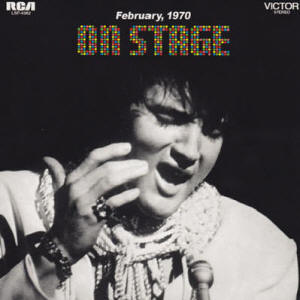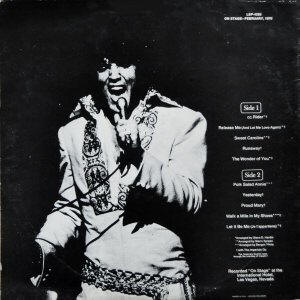Verdict
Elvis is brim-full of energy, in his best voice and the songs are chosen and sequenced well.
![]()
(C) RCA Records
The ultimate site about the king of the analogue age


On July 1, 1970 RCA Victor released Elvis' second live album within not even a year. Nevertheless it was bought by half a million people and so it entered the "Top LPs Chart" on July 20th, had a run of 20 weeks and peaked at number 13. The RIAA honored the domestic sales with a Gold Award in 1971 and updated the status to Platinum in 1999. Outside of the US "On Stage - February 1970" also sold well, in Great Britain it became a number 2 hit. Worldwide RCA was able to retail 3 million units, which equals 450 million paid streams of the complete album or 4.5 billion paid streams of individual tracks.
In 2016 the complete Presley catalogue was restored and remastered by Vic Anesini for a boxed set of 60 compact discs called "The Album Collection". Sony Music Entertainment provides the streaming platforms with the same versions of the individual albums (some of them offering bonus tracks), albeit in 24 bit/90 khz flac. That means, if the platform of your choice supports high resolution audio, you can enjoy the tracks in the same quality Sony used to scan and master them. On Spotify, which has a market share of approximately 30% and is the only platform that publishes streaming figures, "On Stage - February 1970" accumulates 117 million streams and is requested >55,000 times per day. In other words: It's still a popular item of the Presley catalogue.
Just like they had done way back in 1959, RCA Victor didn't mention the artist's name on the cover, but relied on the familiarity of his face. For the first time Elvis was shown in a jumpsuit with a high collar, which would become his trademark for the rest of his career.
The album has a running time of 31:57 minutes.
While the first live album included many of his greatest hits, this new one exclusively featured songs, that had not been recorded by Elvis before. For this project Felton Jarvis (producer) and Al Pachucki (sound engineer) taped parts of the shows between February 15th and 19th at the International Hotel in Las Vegas/Nevada. Elvis' band consisted of James Burton (guitar), Charlie Hodge (guitar), John Wilkinson (guitar), Jerry Scheff (bass), Bob Lanning (drums) and Glen D. Hardin (piano). The group was supported by Bobby Morris and his orchestra. The harmony vocals were provided by The Imperials (Armond Morales, Terry Blackwood, Jimmie Murray and Roger Wiles) as well as The Sweet Inspirations (Myrna Smith, Silvia Shemwell, Estelle Brown and Ann Williams). Between March 31st and April 3rd Felton Jarvis recorded additional harmony vocals at RCA Studio A in Nashville/Tennessee.
In 2012 Follow That Dream Records released a collector's edition of "On Stage - February 1970", which featured further live material. For a review tap HERE.
C. C. Rider
The album starts with a recording, made during the midnight show on February 18, 1970. The postproduction was processed on April 1st. "C. C. Rider" had been a top20 hit for Gertrude Ma Rainey as early as in 1924. Rainey and Lena Arant are credited as writers. In fact, the song is based on a traditional blues, whose origins are unknown. "C. C." stands for "country circuit", which means a travelling person. Another interpretation is, that "C. C. Rider" actually means "Easy Rider", which was the term for a prostitute or a person, who is accessible for informal sex. So maybe "C. C. Rider" was just used as a substitute for "Easy Rider" to bypass censorship. However, somebody has broken the narrator's heart and he threatens this person to leave for good. Elvis turned this slow song into a hard-rocking blues with a driving rhythm. Maybe inspired by this album, he started to use this song to open his concerts in 1972 and stuck with this idea up to the very end. But he would never archive the intensity of his early performances again. Live versions of "C. C. Rider" (by then dubbed as "See See Rider") can be heared on the albums "Aloha From Hawaii Via Satellite" (1973), "Elvis Recorded Live On Stage In Memphis" (1974) and "Elvis In Concert" (1977).
Release MeIn 1970 most people were familiar with the version by Engelbert Humperdinck, who had scored a top5 hit with "Release Me" in 1967. Elvis performed the song much faster and focused on the rhythm as well as the interaction with the harmony singers. He obviously liked the song, because he kept it in his show until his final concert. The performance on this album was taped during the midnight show on February 18, 1970. Additional harmony vocals were recorded on March 31st. In 1977 RCA released a remix on the album "Welcome To My World". The song was first released by its writer, Eddie Miller. However, the cover versions by Jimmy Heap & His Melody Master With Perk Whilliams (#5), Ray Price (#6) and Kitty Wells (#8) were much more successful.
Sweet CarolineNeil Diamond had written and recorded "Sweet Caroline" and scored a top5 hit with the song on the Billboard Charts in 1969. Even though it was a new song, Elvis didn't hesitate to cover it. He performed it in a faster, more powerful style and improved the original quite a bit. Ironically Neil Diamond later would copy the king's arrangement for his live performances of "Sweet Caroline". The version here was recorded on February 16, 1970 (dinner show) and overdubed with harmony vocals on March 31st. In 1970 and 1971 the song was a regular feature of Elvis' concerts, in early 1974 it got a short-lived revival.
RunawayWhen it turned out, that the show didn't include enough new songs for the album, Felton Jarvis simply used recordings he had made the previous year for "From Memphis To Vegas / From Vegas To Memphis". The performance of "Runaway" had been taped during the dinner show on August 25, 1969. It was overdubed on March 31st, but the result failed to please and the procedure was repeated on April 1st. "Runaway" was written by Max T. Crook and Del Shannon, who had a number 1 hit with the song in 1961. Elvis obviously has fun with the song and it's also great to hear James Burton's guitar licks. Fun fact: Burton had also played guitar on Shannon's original recording.
The Wonder Of YouThis one would reappear on the boxed set "The Other Sides - Worldwide Gold Award Hits Volume 2" (1971), because it had been released on the flipside of "Mama Liked The Roses". However, nobody cared for the supposed a-side and "The Wonder Of You" became a top 10 hit. It was written by Baker Knight, the first artist to sing the power ballad was Ray Peterson. Elvis' version was taped during the midnight show on February 18, 1970 at the International Hotel in Las Vegas. It was the second time the king performed the song live, because originally it had not been on the set list. When Felton Jarvis realized that the show didn't include enough new songs for the planned album, additional rehearsal sessions were held and further material was added. On March 31st and April 3rd "The Wonder Of You" was touched up with additional harmony vocals and the re-recording of some instruments. I like the song very much, because Elvis performs it at the peak of his powers.
Polk Salad AnnieIn the summer of 1969 Tony Joe White had scored a top 10 hit with "Polk Salad Annie". Elvis instantly loved the swamp rock about a dysfunctional southern family. He didn't just sing the song, he virtually celebrated it. On the album "Elvis As Recorded At Madison Square Garden" we hear a faster, less skillful performance. Over the years the arrangement became more bombastic and had less and less in common with what can be enjoyed here. Nevertheless Elvis never lost his pleasure for singing "Polk Salad Annie" and kept it in the show until 1977. This version was taped during the midnight show on February 18, 1970. The overdubs were made on April 1st.
YesterdayThis is another recording Felton Jarvis "borrowed" from the previous live project. Originally Elvis had performed a medley of "Yesterday" and "Hey Jude", but because the king had just used the "na na na"-part, the latter one was left out. The recording was made on August 25, 1969 (dinner show) and enhanced with further hamony vocals on March 31, 1970. Elvis sings the song well, but not as good as Paul McCartney did on the album "Help!".
Proud MaryJohn Fogerty's hommage to a paddle steamer had been a number 2 hit for Creedence Clearwater Revival in 1969. Once again Elvis didn't mind to cover a relatively new song. It's a rockin' performance all the way and the king is obviously enjoying himself. However, I like the version on "Elvis As Recorded At Madison Square Garden" (1972) better. The song was taped during the dinner show on February 16th, the enhancements were made on March 31, 1970.
Walk A Mile In My ShoesOn stage Elvis presented a medley of "Walk A Mile In My Shoes" and "In The Ghetto". But because the latter one had already been featured on "From Memphis To Vegas / From Vegas To Memphis" the song was left out. The medley was recorded on February 19, 1970 and enhanced with overdubs on April 1st. This time Elvis took his covering of recent hits quite far, because Joe South had released his original version in January 1970. "Walk A Mile In My Shoes" fits the king well, it somewhat continued in the vane of "If I Can Dream" (1968) and "In The Ghetto" (1969). However, it was a bold choice to sing a socially critical song in Vegas.
Let It Be MeThe album closes with a recording from February 17, 1970 (midnight show). Further harmony vocals were overdubed on March 31st. The original is called "Je T' Appartiens" and was written by Pierre Delanoe and Gilbert Becaud. English lyrics were later added by Mann Curtis. "Let It Be Me" was also recorded by The Everly Brothers (1960, #7) and Glen Campbell & Bobby Gentry (1969 #36). Elvis loved "Let It Be Me" and intoned it during several rehearsal sessions. One day Glen D. Hardin wrote arrangements and gave them to the musicians. When the king entered the room, they began to play the song. Elvis joined in and gave a complete performance. On the spot he decided to include "Let It Be Me" in his show. On this recording you can also hear his joy of singing this song. His vocals are great, the band is great, the orchestra is great and the choir is great. You guessed it: The performance is great!
Elvis is brim-full of energy, in his best voice and the songs are chosen and sequenced well.
![]()
(C) RCA Records